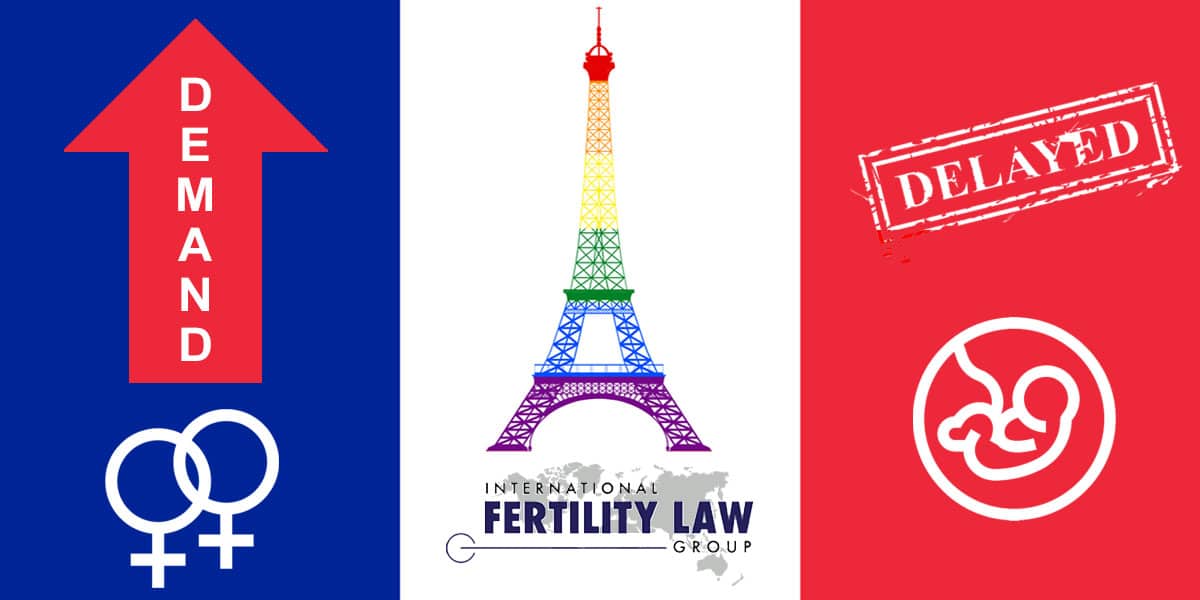
18 Jan 2022 Demand creates delays for single, lesbian women under French fertility law reforms
This past summer we celebrated France’s hard-fought legalization of in vitro fertilization (IVF) and other types of assisted reproductive technology for single women and lesbian couples. Pent-up demand, which has far exceeded government projections, quickly overwhelmed providers of fertility services, resulting in months-long wait times. Many women have resorted to traveling to other countries for services.
We here at IFLG have followed for several years the extended efforts to reform France’s reproductive laws. Previously, under French law, fertility treatments such as IVF, egg-freezing or administration of fertility drugs were available only to heterosexual couples who had been married or had cohabited for at least two years.
France’s 2-Year Fight for Reproductive Law Reform
French President Emmanuel Macron campaigned on a promise to extend those services to single women and lesbians, and in July 2019 his government introduced a new bioethics law that would legalize in vitro fertilization, or IVF, for single women and lesbians—an incomplete but significant step toward equal reproductive rights. The measure drew immediate fire from conservative religious and political forces, and the fight continued through the next two years of the Macron administration.
The reform bill passed the French lower house in October 2019, and was approved by the French Senate in January 2020, but not before excluding single women and lesbians from receiving national health service coverage for assisted reproductive benefits, provided free to heterosexual women under age 43. As we reported then, “Senators based their opposition to the public funding on the fact that heterosexual couples are covered for fertility services due to a medical condition.”
Then, in February 2021, the French Senate voted to prohibit IVF and other reproductive services entirely for single women and lesbians, sending the bill back for more debate. Finally, in July 2021, the French Parliament passed the law, granting single women and lesbian women the same rights to access and coverage as heterosexual and coupled women. At long last, the law took effect in September 2021.
Apparently, a lot of women had been waiting.
Demand for fertility services outpaces French providers
As of November 2021, 2,750 single women or lesbian couples had applied for reproductive health services, a sudden tripling of demand, overwhelming the reproductive health care system, as reported by French public radio station RFI. French hospitals and clinics reported a two-month surge of patients that exceeded what they normally got in an entire year. Some providers aren’t answering the phones or taking appointments. Many women, frustrated by the lengthy waits, have resorted to going to Spain or Belgium and paying for the services themselves. As is the case in much of the pandemic-era world, French hospitals are understaffed, with biologists, gynecologists and psychologists in particularly short supply.
In October 2021, health minister Olivier Véran appropriated an extra 8 million euros for fertility clinic staffing and equipment. But some activists say it’s too little, too late, and that the government should have foreseen the demand for services.
Impacted by COVID pandemic shutdowns, many countries are seeing shortages of sperm donors that have created bottlenecks for services. So far French providers say they have plenty of sperm—but that could change in the near future. France prohibits the importation of sperm from other countries, and its Biomedecine Agency reports a decline in donations since 2018, even as the number of egg donors has grown. But under the new law, as of September 2022, sperm and egg donation in France will no longer be anonymous, and children conceived using donated genetics, once they reach adulthood, will be able to identify their donors. Some experts feel this loss of anonymity will have a chilling effect, as we reported last year, particularly for sperm donors.
France takes a step toward reproductive equality as U.S. Supreme Court considers a step back
The tremendous outpouring of demand for assisted reproduction services for single women and lesbian couples is clear evidence that French women wanted and needed this law. Even though it was an uphill battle to get this far, and despite the painful struggle to ramp up services to meet demand, the popularity of this limited reform in health policy means that more changes are likely to follow. This new law does nothing to make it easier for single men and gay couples in France who want to become biological parents, and surrogacy remains illegal there. But success breeds success. Once the French health system works out the kinks, the happy stories of women fulfilling their dreams of parenthood, the images of new families created through this miraculous technology, all will have an impact on public opinion, on lawmakers and on the courts.
Even as our own country teeters on the brink of an unprecedented roll-back of human rights, as the U.S. Supreme Court appears to consider stripping American women of their right to control over their own bodies, France’s recent progress toward reproductive equality is heartening. Here’s hoping France’s fierce battle for reproductive rights will remind us in the U.S. of just how much we stand to lose and how important it is to continue the fight.

















